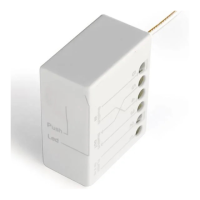16 – English
EN
8
MORE INFORMATION
8.1 - WHAT TO DO IF... (Troubleshooting guide)
• The automation stops or always reverses the maneuver before finishing it.
If the ECSbus network is the “mixed” type, make sure there is no optical inter ference
between the wireless photocells and the hardwired ones; in this case, solve the
problem by inverting the TX and RX elements of the wireless photocells.
•
The automation does not stop and does not reverse the maneuver when
a safety device intervenes.
– Make sure that the control unit has acquired all the devices on the WM100
interface: if the control unit has not acquired them, the WM100 signals this sta-
tus with a periodic beep emitted during the manoeuvre or during the “operation
check”. Therefore, perform the device search procedure with the control unit,
following the steps indicated in the control unit instruction manual.
– If the problem persists, make sure the various devices of the same type (e.g. all
the pairs of photocells) do not have the same jumper configuration.
• The flashing light only works during the “operation check” pro cedure.
Check proper connection of the device to the “Flash” terminal of the control unit
and make sure this output is configured with the “flashing” function. Moreover,
make sure the jumpers are positioned properly in the device.
8.2 - MAINTENANCE
Maintenance of system devices does not require any special measures. It is requi-
red to run a test every six months; to check the condition of the devices (presence
of moisture, oxidation, etc.), externally clean them and inspect the system accor-
ding to the procedure described in the chapter titled “Inspection”.
In the devices having a photovoltaic cell, perform more frequent checks of the cle-
anliness of the surface occupied by the solar cell to guarantee maximum efficiency
of the recharging process. The system devices are designed to work for at least
10 years under normal conditions. After 10 years, it is advisable to intensify the
frequency of the maintenance interventions.

